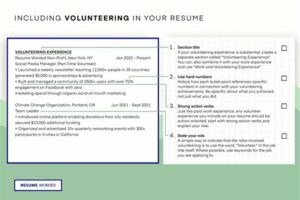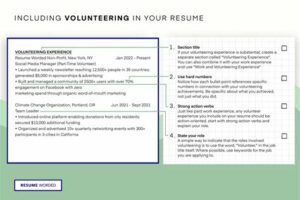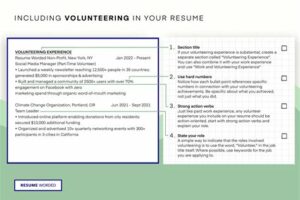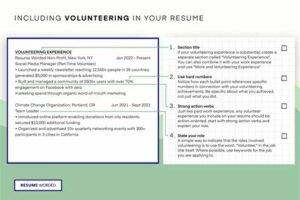Table of Contents
Learn how to effectively include your volunteer work on your resume with our step-by-step guide. Discover the best format, keywords, and tips to showcase your volunteer experience and highlight your skills to impress employers. Boost your chances of landing your dream job by presenting your dedication to community service in a professional and impactful way.
Are you wondering how to effectively showcase your volunteer work on your resume? Look no further. Including volunteer experience on your resume is not only a way to demonstrate your commitment to community service, but it can also greatly enhance your overall professional profile. In this article, we will provide you with valuable insights and practical tips on how to strategically place your volunteer work on your resume. So, let’s dive in and learn how to make your volunteer experience shine on paper.
Introduction
Volunteering not only allows individuals to contribute to their communities but also provides valuable skills and experiences that can enhance a resume. Including volunteer work on your resume can demonstrate your commitment, dedication, and ability to work in a team. However, it’s important to know how to effectively showcase your volunteer experience in a professional manner. In this article, we will guide you through the process of placing volunteer work on your resume.
1. Determine the Relevance
Before including any volunteer work on your resume, it’s crucial to evaluate its relevance to the job you are applying for. Consider the skills, knowledge, and experiences gained from your volunteer work and determine how they align with the requirements of the position you’re seeking.
2. Create a Separate Section
To highlight your volunteer work effectively, create a separate section dedicated specifically to this experience. This allows employers to easily identify and understand your involvement in community service. You can title this section as Volunteer Experience or Community Involvement.
3. Provide Clear Details
When listing your volunteer work, provide clear details about each experience. Include the organization’s name, your role, and the duration of your involvement. If you held any leadership positions or completed specific projects, be sure to mention those as well.
4. Emphasize Achievements and Skills
Highlight the achievements and skills you acquired through your volunteer work. For example, if you organized a successful fundraising event, managed a team, or developed strong communication skills while volunteering, make sure to include these details. This will demonstrate your ability to take initiative and contribute effectively.
5. Quantify Your Impact
To further enhance the impact of your volunteer work, quantify your achievements whenever possible. For instance, mention the number of people you helped, funds raised, or hours contributed. Quantifying your impact adds credibility and demonstrates the value you brought to the organization.
6. Tailor to the Job Description
Just like any other section of your resume, tailor your volunteer experience to match the job description. Identify the skills and qualities the employer is seeking and highlight how your volunteer work has equipped you with those attributes. This customization will make your application more compelling.
7. Address Relevant Skills in the Summary
Incorporate a summary statement at the beginning of your resume that briefly highlights your most relevant skills and experiences. If your volunteer work aligns closely with the position you’re applying for, mention it in the summary to grab the employer’s attention from the start.
8. Use Action Verbs
When describing your volunteer work, use action verbs to make your accomplishments more impactful. Instead of saying helped organize events, consider using coordinated and executed fundraising events. These action verbs add power and specificity to your experiences.
9. Include Professional Associations
If you volunteered with a professional association or industry-related organization, be sure to include this information on your resume. It showcases your dedication to staying connected within your field and can impress potential employers.
10. Update Regularly
Lastly, remember to update your volunteer work section regularly. As you engage in new volunteering opportunities and gain additional skills, keep your resume up to date. This ensures that your most recent experiences are accurately reflected in your application.
In conclusion, incorporating volunteer work on your resume can be a powerful way to showcase your commitment, skills, and community involvement. By following these guidelines, you can effectively present your volunteer experiences in a professional manner and increase your chances of securing the job you desire.
Introduction: Highlight Your Volunteer Work
Including volunteer work on your resume can showcase your dedication, commitment, and values. By creating a specific section for your volunteer experience, you can demonstrate your well-roundedness and showcase your ability to take on responsibilities outside of your professional life.
Choose Relevant Volunteer Experience
When deciding which volunteer experiences to include on your resume, focus on those that are relevant to the position you are applying for. Highlighting volunteer roles that align with the skills and qualifications required for the job will show recruiters that you possess the necessary expertise and dedication.
Provide Detailed Descriptions
For each volunteer experience listed, provide a concise but detailed description of your responsibilities and accomplishments. Highlight the skills you developed or honed during your volunteer work and emphasize any leadership or project management roles you held.
For example, if you volunteered at a local animal shelter, you could mention that you were responsible for coordinating adoption events, managing a team of volunteers, and ensuring the well-being of the animals in your care. This demonstrates your ability to handle multiple tasks, work well with others, and take on a leadership role.
Quantify Your Impact
Whenever possible, quantify the impact you made during your volunteer experience. Include statistics, such as the number of individuals you served, funds raised, or projects completed. Quantifying your impact adds credibility to your resume and helps employers understand the scope and scale of your volunteer work.
For instance, if you volunteered at a food bank, you could mention that you helped distribute meals to over 500 families per week or that you organized a fundraising event that raised $10,000 to support the organization’s mission. These numbers demonstrate the tangible results of your volunteer efforts and showcase your ability to make a significant impact.
Showcase Transferable Skills
Volunteer work often provides an opportunity to develop transferable skills that can benefit your professional career. Highlight these skills on your resume, such as communication, teamwork, problem-solving, and adaptability. Emphasize how these skills can contribute to your effectiveness in the job you are applying for.
For example, if you volunteered as a mentor for underprivileged youth, you could mention that you developed strong communication and mentoring skills, as well as the ability to adapt to different situations and work effectively as part of a team. These skills are highly valued by employers and can set you apart from other candidates.
Include Relevant Training or Certifications
If you received any specialized training or certifications during your volunteer work, be sure to include them on your resume. These certifications can add value and demonstrate your commitment to professional development in related areas, making you an even more attractive candidate.
For instance, if you volunteered as a disaster response team member and received training in emergency preparedness and first aid, you could highlight these certifications on your resume. This shows that you have acquired valuable skills and knowledge that can be applied to various situations, making you a valuable asset to potential employers.
Emphasize Leadership Roles
If you held any leadership positions during your volunteer experience, showcase them prominently on your resume. Mention any committees or teams you oversaw, projects you managed, or initiatives you spearheaded. This highlights your ability to lead and manage, making you an appealing candidate for positions requiring leadership skills.
For example, if you volunteered as a team leader for a community service project, you could mention that you successfully coordinated a team of 20 volunteers, delegated tasks, and ensured the project’s completion within the given timeframe. This demonstrates your ability to take charge, make decisions, and motivate others, which are valuable skills in any professional setting.
Highlight Volunteer Work Related to Your Career Path
If you have volunteer experience directly related to your career path, prioritize those experiences on your resume. This will show employers that you have hands-on experience in your field of interest and are passionate about making a difference. Such experience can also help you differentiate yourself from other applicants and increase your chances of landing a job in your desired industry.
For instance, if you are applying for a marketing role and have volunteered as a social media manager for a non-profit organization, you could highlight this experience on your resume. Mention the strategies you implemented, the results you achieved, and the impact you made on the organization’s online presence. This demonstrates your practical skills and knowledge in the marketing field, making you a strong candidate for marketing positions.
In conclusion, including volunteer work on your resume can greatly enhance your chances of landing a job. By highlighting relevant experiences, providing detailed descriptions, quantifying your impact, showcasing transferable skills, including relevant training or certifications, emphasizing leadership roles, and highlighting volunteer work related to your career path, you can effectively demonstrate your dedication, skills, and passion to potential employers. So, don’t underestimate the value of volunteer work – it can make a significant difference in your job search and showcase your well-roundedness to employers.
In today’s competitive job market, it is essential to showcase not only our professional experience but also our commitment to social causes and community involvement. One great way to do this is by including volunteer work on our resume. Here are some points of view on how to effectively place volunteer work on a resume:
Highlight relevant skills:
Mention the specific skills acquired or enhanced through volunteer work that are applicable to the desired position.
For example, if you volunteered at a local animal shelter, you can emphasize your ability to work in a team, communicate effectively, and demonstrate empathy.
Showcase impact:
Describe the impact or outcomes achieved through your volunteer work.
Quantify results whenever possible, such as the number of people helped, funds raised, or projects completed.
Highlighting your contributions demonstrates your dedication, motivation, and ability to make a difference.
Include relevant experiences:
If you have limited professional experience, volunteer work can help fill in the gaps and show your commitment to personal growth.
Focus on volunteer roles that align with the skills and qualities sought after in the position you are applying for.
Organize effectively:
Create a separate section on your resume specifically for volunteer work.
List the organization’s name, your role, the duration of your involvement, and a brief description of your responsibilities.
Use bullet points to make it easy for employers to scan and understand your volunteer experience quickly.
Be honest and authentic:
Always be truthful about your volunteer experiences and avoid exaggerations or embellishments.
Employers appreciate genuine experiences that align with their company values.
Highlighting your passion and commitment will help you stand out among other candidates.
Remember, including volunteer work on your resume not only demonstrates your character but also showcases your dedication to causes beyond your professional life. It can provide valuable insights into your skills, values, and community involvement, making you a well-rounded candidate in the eyes of potential employers.
Thank you for visiting our blog and taking the time to read our article on how to place volunteer work on your resume. We understand that including volunteer experience on your resume can be a valuable asset in today’s competitive job market, and we are here to provide you with some useful tips and insights to help you effectively showcase your volunteer work.
First and foremost, it is important to highlight your volunteer experience in a professional manner. While volunteer work may not be directly related to your desired job position, it still demonstrates qualities and skills that can be transferable to the workplace. When describing your volunteer experience, use strong action verbs and specific examples to showcase your accomplishments. For example, instead of simply stating that you volunteered at a local food bank, you could mention that you coordinated a team of volunteers and successfully organized a fundraising event that raised X amount of money to feed X number of families in need. By providing concrete details, you not only demonstrate your abilities but also show potential employers the impact you made through your volunteer work.
Additionally, it is important to place your volunteer work strategically on your resume. One effective way to do this is by creating a separate section dedicated to your volunteer experience. This allows you to highlight your commitment to community service and draw attention to the skills and experiences gained through your volunteer work. Include the name of the organization, your role or position, and the dates of your involvement. If you have held multiple volunteer positions, consider organizing them in reverse chronological order to showcase your most recent and relevant experiences first.
In conclusion, incorporating your volunteer work into your resume can significantly enhance your chances of securing a job interview and ultimately landing your desired position. By presenting your volunteer experience in a professional manner, using strong language and specific examples, and strategically placing it on your resume, you can effectively demonstrate your dedication, skills, and contributions outside of the traditional work environment. Remember, volunteer work is not just about giving back to the community; it also allows you to develop valuable skills and experiences that can make you a well-rounded candidate in the eyes of potential employers. Good luck on your job search!
Thank you once again for visiting our blog, and we hope you found this article helpful. If you have any further questions or need additional guidance, please feel free to reach out to us. We are here to support you in your career journey.
.
People also ask about how to place volunteer work on a resume:
Should I include volunteer work on my resume?
Where should I list volunteer work on my resume?
How should I format my volunteer work on a resume?
What if I don’t have much volunteer work to include?
Should I prioritize volunteer work over professional experience?
How can I make my volunteer work stand out on a resume?
Yes, including volunteer work on your resume can be beneficial, especially if it is relevant to the job you are applying for. It showcases your dedication, skills, and commitment, and can demonstrate your ability to work in a team or handle various responsibilities.
List your volunteer work under a separate section, such as Volunteer Experience or Community Involvement. This allows potential employers to easily identify and evaluate your volunteer experience alongside your professional work history.
When formatting your volunteer work on a resume, include the organization’s name, your role or position, the dates of your involvement, and a brief description of your responsibilities and accomplishments. Use bullet points to highlight key achievements and skills gained during your volunteer work.
If you have limited volunteer experience, consider including any relevant unpaid internships, community service projects, or involvement in clubs/organizations. If you don’t have any directly related experience, focus on transferable skills gained from your volunteer work, such as leadership, teamwork, communication, or problem-solving abilities.
Generally, your professional experience should take precedence over volunteer work, especially if it is more relevant to the job you are applying for. However, if your volunteer work aligns closely with the desired skills or responsibilities of the position, you may choose to prioritize it by placing it above your professional experience.
To make your volunteer work stand out, emphasize the impact you made and quantify your achievements whenever possible. For example, mention the number of people you helped, funds you raised, or projects you successfully completed. Additionally, highlight any leadership roles or unique experiences that set you apart from other candidates.
Remember to tailor your resume to each specific job application, highlighting the volunteer work that best showcases your skills and aligns with the requirements of the position.






